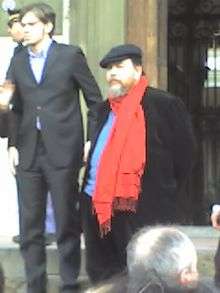Giuliano Ferrara
| Giuliano Ferrara | |
|---|---|
 Giuliano Ferrara in Florence (right) | |
| Born |
Giuliano Ferrara 7 January 1952 Rome, Italy |
| Occupation | Journalist, politician (formerly) |
| Political party |
|
| Religion | Theism[1] |
| Spouse(s) | Anselma Dell'Olio (1987-present) |
Giuliano Ferrara (born in Rome on January 7, 1952) is an Italian politician, journalist, founding editor of Il Foglio, and TV presenter.
Life and career
Ferrara came from a family of Communists: his father Maurizio was a communist senator. Ferrara was active in the Italian Communist Party during his twenties. In 1982, he broke with the party and became vocal as an ex-Communist. Influenced by the political philosopher Leo Strauss, he initially gravitated toward socialism, but later moved toward social conservatism. He was in the Berlusconi I Cabinet and founded the newspaper Il Foglio.
He has been one of strongest supporters of Pope Benedict XVI. Althogh considered by his opponents a "devout atheist", he now considers himself a theist.[1]
He is married with writer Anselma Dell'Olio, who fought for woman's rights in the feminist movements during the 1960s and 1970s.
Legal problems
In 2003, Antonio Tabucchi wrote an article about bad facts about Giuliano Ferrara for the French newspaper Le Monde, but the article was never published because Giuliano Ferrara interfered with them publishing it on its own newspaper Il Foglio. He then said that he was happy to have reached the goal to get that article before Le Monde newspaper. He was condemned for unauthorized publishing and for copyright infrangement.[2]
Political positions
Abortion
In 1989 Ferrara used the pages of Corriere della Sera to criticize what he perceived as a decline in male responsibility following the introduction of the first abortion pills.[3]
In 2008 he ran in the Italian general election on a platform favoring a moratorium on abortion, as part of a theoconservative Italian political current of which he's one of the most prominent leaders. These views might seem surprising, as, during his Communist period, by his own acknowledgment three of his partners had abortions.[4]
Europe's Christian roots
Ferrara agrees with the Catholic Church regarding the defense of the Judeo-Christian roots of Europe.
References
- 1 2 "Nè ateo nè devoto" [Neither atheist nor devout]. tempi.it (in Italian). 26 April 2007. Archived from the original on 6 October 2007. Retrieved 1 November 2016.
In realtà io ateo non sono, la mia è una posizione teista. Io non ho una fede personale, non ho questo dono, questa grazia soprannaturale e non ho una confessione praticata e osservante. [...] Io ho una posizione che praticamente è quella richiamata da Ratzinger parafrasando Ugo Grozio: quella di vivere come se Dio esistesse. [Actually I'm not an atheist, I have a theist view. I do not have a personal faith, I don't have this gift, this supernatural grace and I do not follow nor observe any confession (...) My position is the one Joseph Ratzinger cited paraphrasing Hugo Grotius: I live as if God existed]
- ↑ http://www.irpi.ccip.fr/upload/pdf/decisions/080909_Cass_Giuliano.pdf
- ↑ Giuliano Ferrara (5 November 1989). "Maschio sempre più irresponsabile con la nuova "pillola" per abortire". Corriere della Sera.
- ↑ The New York Times
External links
- Articles written on Panorama (Italian)
| Assembly seats | ||
|---|---|---|
| Preceded by — |
Member of the European Parliament for Italy 1989–1994 |
Succeeded by — |
| Government offices | ||
| Preceded by Paolo Barile |
Italian Minister for Parliament 1994–1995 |
Succeeded by Guglielmo Negri |
| Media offices | ||
| Preceded by Andrea Monti |
Editor in chief of Panorama 1996 |
Succeeded by Roberto Briglia |
| New title | Editor in chief of Il Foglio since 1996 |
Incumbent |
| New title | Host of Otto e mezzo 2001–2008 |
Succeeded by Lilli Gruber |